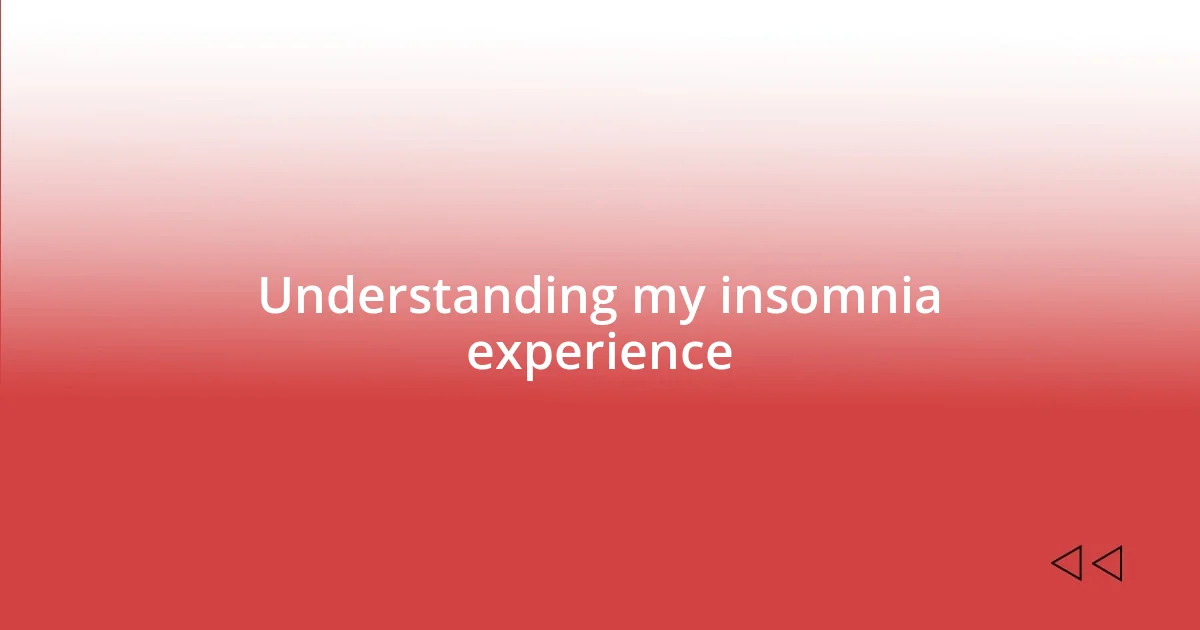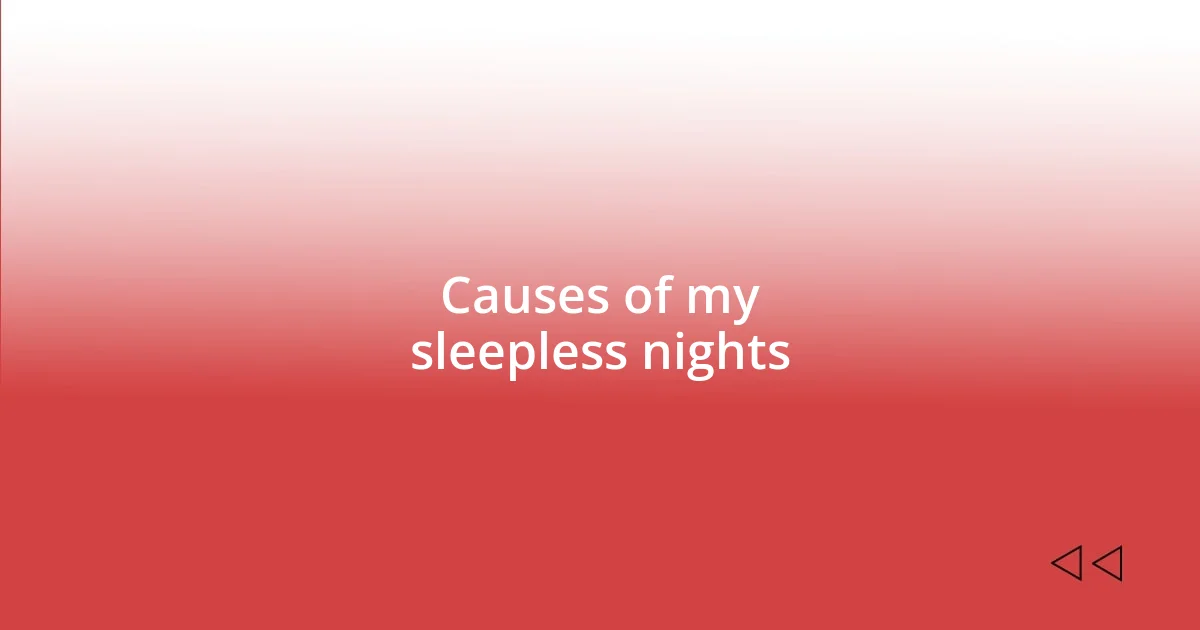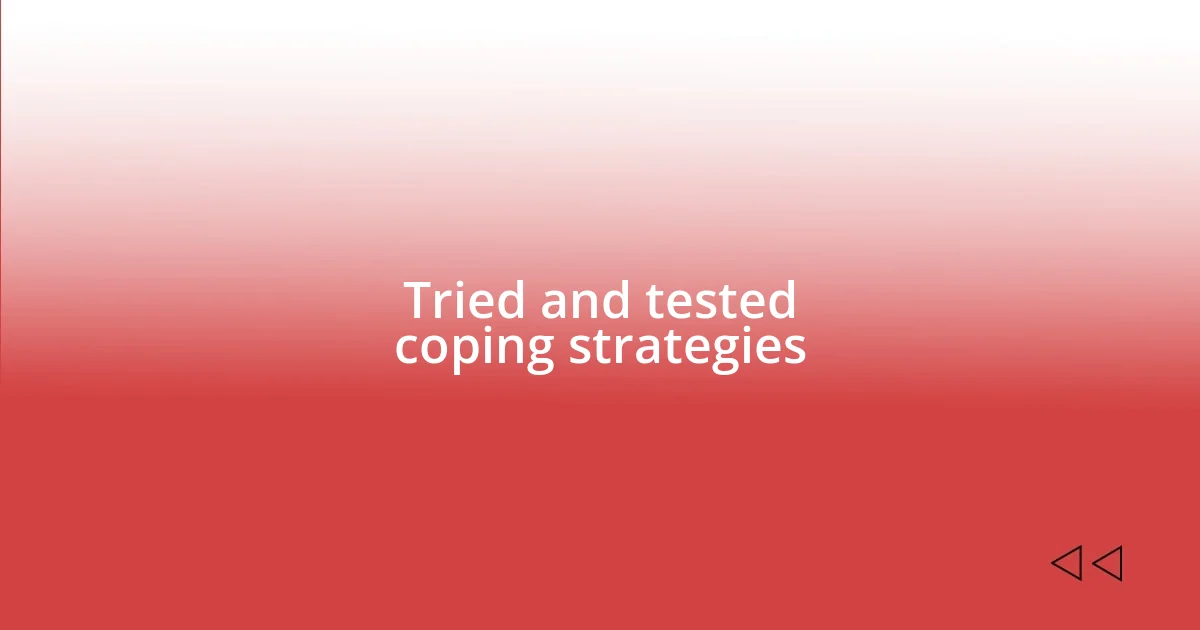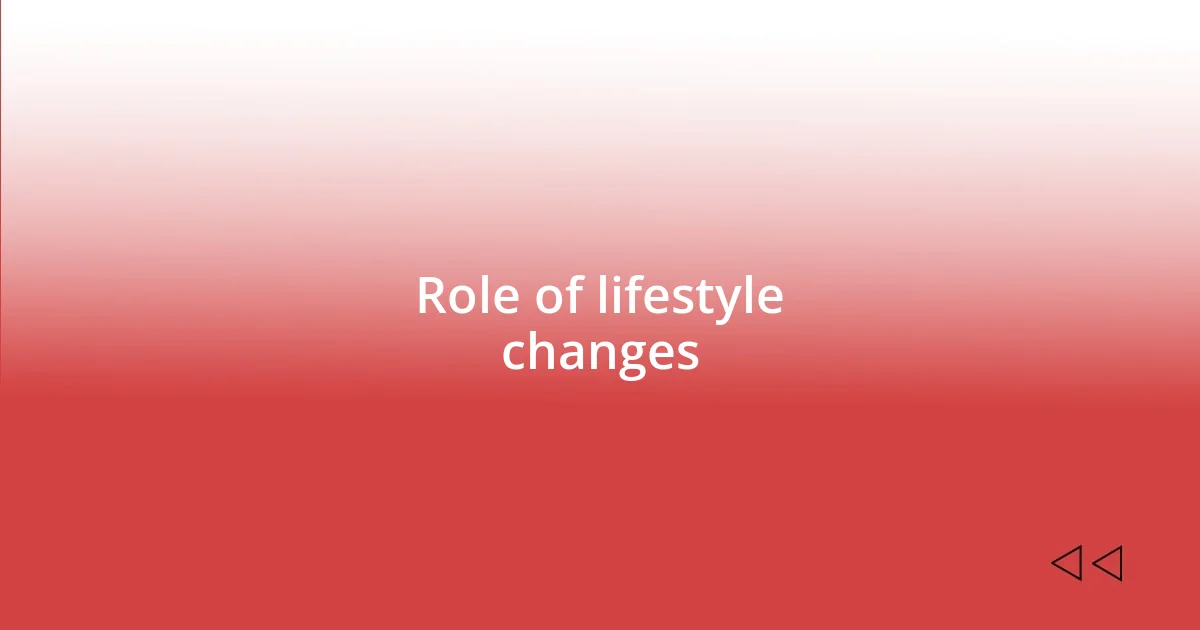Key takeaways:
- Identifying insomnia as a complex interplay of physical and emotional factors led to self-reflection and journaling, which helped in understanding personal struggles.
- Implementing lifestyle changes, such as reducing caffeine intake and establishing a bedtime routine, significantly improved sleep quality and overall well-being.
- Seeking professional help, including cognitive-behavioral therapy and support groups, can provide valuable insights and support in overcoming insomnia.

Understanding my insomnia experience
Understanding my insomnia experience has been a journey filled with frustration and introspection. I recall one particularly sleepless night, lying in bed while the world outside seemed to drift peacefully into dreams. Why was it so hard for me to find that elusive state of rest? I often wondered if it was my racing thoughts or perhaps the pressure of my daily responsibilities that built an invisible wall between me and sleep.
There were times when I’d find myself staring at the clock, each tick amplifying my anxiety about not falling asleep. I remember feeling an overwhelming sense of isolation—like I was the only one awake while the rest of humanity slumbered. This led me to ponder: Is insomnia merely a physical ailment, or does it reveal deeper emotional struggles? These sleepless hours often forced me to confront my insecurities, dreams, and hopes, intertwining my mental state with my sleep patterns in a way I never expected.
As I delved deeper into understanding my insomnia, I discovered it was not just about the lack of rest; it was a mirror reflecting my internal chaos. I started journaling my thoughts, realizing that many sleepless nights stemmed from unresolved stress or unexpressed emotions. When I finally acknowledged these feelings, I felt a subtle shift. Could it be that by addressing what kept me awake, I could also begin to heal and reclaim my nights? Each revelation brought me closer to understanding not only my insomnia but also myself.

Causes of my sleepless nights
I soon realized that several key factors contributed to my sleepless nights. From personal experiences, I noticed that my environment played a significant role. For instance, on nights when I consumed caffeine too late in the day, I’d become a restless ball of energy, unable to calm my mind. My own high expectations also loomed large, as I often felt the pressure of deadlines hanging over me, which only amplified when darkness fell.
Some of the main causes of my sleepless nights included:
- Stress and Anxiety: Overthinking daily tasks and future uncertainties kept my mind racing.
- Caffeine and Diet: Late-night snacks and that cup of coffee in the evening were clear signals for my body to stay alert.
- Uncomfortable Sleep Environment: Factors like bright screens and noisy surroundings were constant distractions.
- Poor Sleep Hygiene: I often disregarded consistent sleeping patterns, leading to erratic sleep schedules.
- Emotional Turmoil: My unresolved feelings about various life changes frequently resurfaced during the quiet hours of the night.
As I examined these factors, it became clear how they were intertwined. Every sleepless night felt like a ripple effect, where one issue escalated into another, creating a cycle I struggled to escape.

Tried and tested coping strategies
Throughout my battle with insomnia, I stumbled upon various coping strategies that surprisingly made a difference. One effective approach for me was establishing a bedtime routine. I decided to incorporate calming activities like deep breathing exercises and reading a few pages from a soothing book. This little ritual not only signaled to my body that it was time to wind down, but it also took my mind off the racing thoughts that often kept me awake.
Another strategy I found beneficial involved creating a sleep-friendly environment. I invested in blackout curtains to keep my room dark and used a white noise machine to drown out distractions. These changes transformed my space into a sanctuary for sleep. I vividly recall the first night I settled into my revamped room. It was like finally stepping into a hug of tranquility, a far cry from my previous restless nights.
Lastly, I discovered the importance of mindfulness and reflection. Taking a few moments to journal my thoughts before bed allowed me to release the day’s worries. I often felt a weight lift as I put pen to paper, knowing I’d addressed the emotions keeping me on edge. My experience taught me that these strategies aren’t just about conquering insomnia; they’re about nurturing my overall well-being.
| Coping Strategy | Insights |
|---|---|
| Bedtime Routine | Incorporating calming activities helped me signal that it was time to relax. |
| Sleep Environment | Dark curtains and white noise transformed my space into a peaceful sanctuary. |
| Mindfulness | Journaling allowed me to release worries and achieve mental clarity before sleep. |

Role of lifestyle changes
Making lifestyle changes played a pivotal role in my journey to overcome insomnia. I remember vividly the moment I decided to cut back on caffeine—not an easy feat for someone who thrived on that morning jolt. When I replaced my evening coffee with herbal tea, I felt a gradual shift in how my body reacted as bedtime approached. Who would have thought that such a small change could make my nights more restful?
In addition to my caffeine overhaul, I started prioritizing physical activity during the day. It felt counterintuitive at first; how could running around energize me for sleep? Yet, I quickly discovered that exercise not only helped reduce my stress levels, but it also made my body crave sleep come nightfall. I still remember those days where I would crash on the couch feeling exhausted yet accomplished after a long run. It was a refreshing reminder that sometimes the best antidote to sleeplessness lies in actively engaging with our bodies.
Moreover, reassessing my evening habits proved crucial. I realized the impact of screen time on my sleep quality when, after an hour of scrolling through my phone, I’d feel wired instead of weary. Gradually, I learned to unplug at least an hour before bedtime. How liberating it felt to have that time! Instead of succumbing to the bright lights of my devices, I took up gentle yoga or simply listened to soothing music. It became clear that embracing these lifestyle changes was more than just about seeking sleep; it was about weaving a tapestry of habits that fostered a more peaceful mindset.

Seeking professional help options
When it comes to battling insomnia, seeking professional help can feel like a daunting step, but it’s often essential for long-term solutions. I remember the day I finally called a sleep specialist. I felt a mix of relief and anxiety—would they be able to understand what I was going through? The consultation opened my eyes to options I hadn’t considered, like cognitive-behavioral therapy for insomnia (CBT-I). This approach empowers you to change the thoughts and behaviors that contribute to your sleepless nights, and let me tell you, it was a game-changer for me.
Another avenue that can be beneficial is medication, but this should always be approached with caution. I had a brief stint on a prescription sleep aid, and while it helped me fall asleep initially, it wasn’t a sustainable solution. I learned through discussions with my doctor about how certain medications can lead to dependency, which left me questioning: is a quick fix worth the potential long-term effects? For many, the goal is to find balance, and having professionals guide you through the risks and benefits of these medications can be incredibly valuable.
Don’t underestimate the power of support groups, either. When I joined an insomnia support group, I discovered a community of people with similar struggles. Sharing experiences opened up discussions about various treatment options, making me feel less isolated. Have you ever felt the weight of your sleeplessness lift just by talking about it? Those conversations provided insights I hadn’t thought about, and they emphasized that seeking professional help isn’t a sign of weakness; it’s an important step towards reclaiming restful nights.















